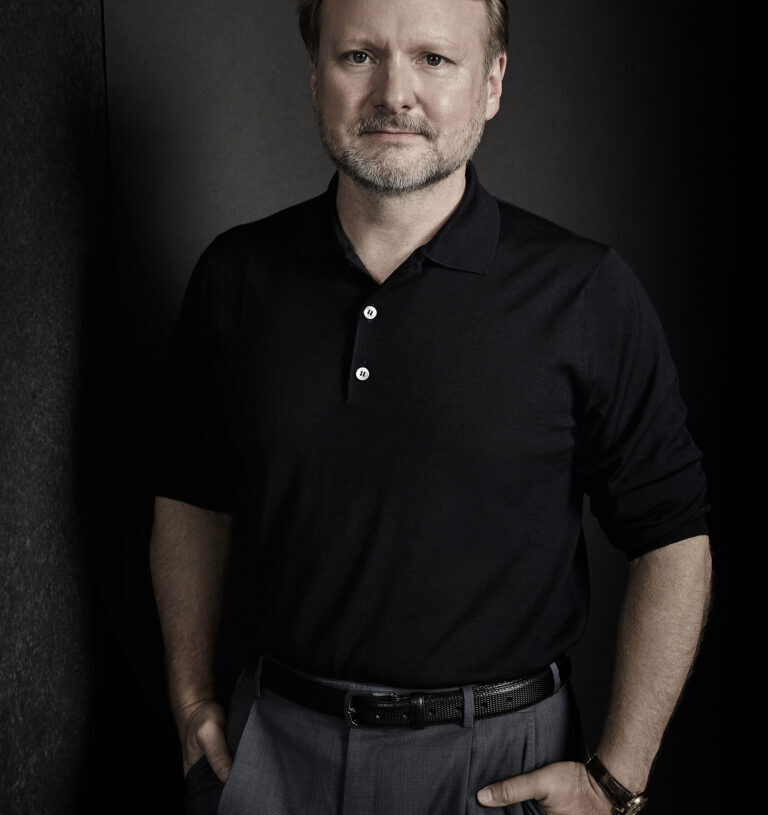PHILADELPHIA
Rian Johnson might strike you as a rock guy. “Knives Out,” his first Benoit Blanc whodunit, shared its title with a Radiohead song. The 51-year-old filmmaker then named its two sequels after Beatles and U2 cuts. But when he’s face-deep in a script, he tends to turn on … show tunes?
Oh yes. He played the “Follies” cast album on repeat while writing 2019’s “Knives Out.” Next, the soundtrack for penning the 2022 follow-up, “Glass Onion,” was “Merrily We Roll Along” — another Stephen Sondheim standby. And which musical helped Johnson bring the latest Blanc mystery, “Wake Up Dead Man,” to life? This time around, it wasn’t just one.
“I have a four-hour-long show tunes playlist that I kind of put together with an absurd amount of thought and care, grouped by theme and tone,” Johnson says over coffee on this mid-October afternoon, hours before “Wake Up Dead Man: A Knives Out Mystery” opens the Philadelphia Film Festival. “When I was writing this, I was listening to that nonstop.”
Later, Johnson texts me the playlist. Two “Cabaret” classics — “Willkommen” and the title tune — bookend the compilation. There are Sondheim staples (“The Ladies Who Lunch,” “Rose’s Turn,” “The Ballad of Sweeney Todd”) and deeper cuts (“Gun Song,” “Chrysanthemum Tea,” “Chromolume #7”). The Golden Age and Andrew Lloyd Webber are well represented. For more contemporary fare, there are selections from “Hamilton,” “The Book of Mormon” and “A Strange Loop.”
“It’s got a real flow to it,” Johnson beams. “I mean, it’s all over the map. But it’s some good s—.”
Johnson probably wouldn’t put it this way, but “all over the map” and “some good s—” aptly describe his oeuvre. His microbudget breakout “Brick” drenched a California high school in neo-noir dread. “The Brothers Bloom” was a madcap caper about the power of storytelling. Johnson’s three “Breaking Bad” episodes grounded his cinematic panache in a crystal meth underworld. The time-traveling “Looper” established his science-fiction bona fides before Johnson leveled up with “Star Wars: The Last Jedi,” his critically acclaimed, fandom-dividing blockbuster.
How does Johnson keep pulling off these genre subversions? There’s his encyclopedic reverence for what came before, and an understanding of how to dance around common genre pitfalls and thrust the forms forward. (“Knives Out” may have been familiar to Agatha Christie heads, but it sustained suspense through its clever nonlinear narrative.) “How did he pull that off?” ingenuity pervades his visuals. (Exhibit A: That virtuosic tracking shot through an intergalactic casino in “The Last Jedi.”) Anchoring it all is a pledge to get his characters — whether it’s Luke Skywalker or Brendan Frye or Benoit Blanc — from Point A to Point B via the most enthralling route imaginable.
The twist: No one has an imagination quite like Johnson’s.
“He has to be really confident to make stuff that’s as unique as he does,” says Joseph Gordon-Levitt, the star of “Brick” and “Looper.” “He has this balance between provoking and challenging his audience to bend or open their minds but also meeting them where they’re at, and just making sure that he tells them a story they want to hear.”
Now that Johnson is playing in a murder-mystery sandbox of his own design, he has no interest in using the same mold twice. If “Knives Out” amounted to a parlor-room throwback and “Glass Onion” was a billionaire-prodding vacation mystery, then “Wake Up Dead Man” is a gothic-horror parable rooted in self-reflection.
Centered on the seemingly impossible murder of Josh Brolin’s Jefferson Wicks, a New York monsignor with a domineering temperament and a thinning congregation, this third installment introduces a slew of suspects for Daniel Craig’s drawling detective Blanc to investigate. Josh O’Connor’s principled priest. Glenn Close’s devout acolyte. Jeremy Renner’s despondent doctor. Kerry Washington’s savvy attorney. Daryl McCormack’s opportunistic influencer. Cailee Spaeny’s ill cellist. Andrew Scott’s paranoid novelist. Thomas Haden Church’s grizzled groundskeeper.
As Johnson explains, “Every one of the characters in the movie is sort of a different fragment of my experience with faith.”
Hitting theaters this week before dropping Dec. 12 on Netflix, “Wake Up Dead Man” echoes its predecessors by stacking mystery upon mystery, then turning the whole thing on its head and giving it all a spin. The result is another taut and twisty crowd-pleaser with plenty on its mind: radicalization and misinformation, greed and vengeance, forgiveness and repentance. But after the previous movies leaned on Johnson’s head and heart, this one comes straight from the soul.
“He’s an incredibly important director, and I don’t mean that lightly,” Craig says. “Wherever the industry is heading — it all feels kind of in flux at the moment, and it feels quite insecure — having someone like Rian around means that great movies are still going to get made.”
Born in Silver Spring, Maryland, Johnson moved with his family to the Denver area as a child, then relocated to San Clemente, California, when he was in middle school. Theirs was a Christian conservative household where Reaganite politics ruled. “My entire world,” Johnson says, “was framed through a very personal relationship with Christ.”
It wasn’t until Johnson enrolled at the University of Southern California that he left the bubble of his upbringing, turned in his “believer” card and formed his own political views. In lieu of a belief system, Johnson spent his 20s searching for a “narrative framing device for the universe” around which to wrap his unmoored mind.
“That very much led me to having this bedrock of who I am,” Johnson says. “This idea of storytelling being the basis of living the life.”
That conclusion was probably inevitable. Johnson was around 10 when he first picked up a camera and began spending his weekends cranking out short films starring friends and family. Most of them were riffs or parodies: “Back of the Future,” “Ghostbusters,” James Bond. (He does fondly remember one original concept, “The Origami Master,” about a ninja with a gift for artistic paper folding.) Although Johnson studied film at USC, he credits reading “Scorsese on Scorsese” and joining his movie buff father at a Robert McKee screenwriting seminar for honing his cinematic instincts.
“He so enjoys the process,” says Nathan Johnson, Rian’s cousin and go-to composer who helped make those amateur flicks decades ago. “I guess that’s maybe the element that still feels like childhood. We kind of can’t believe we get to do this for our life’s work.”
After Johnson followed his original screenplay Oscar nomination for “Knives Out” with an adapted screenplay nod for “Glass Onion,” he kicked around several concepts — including a murder set in the world of theater — for the third film.
Johnson always knew he wanted his next mystery to be more grounded after “Glass Onion” torched the Mona Lisa, used Jared Leto-branded hard kombucha as a key plot point and painted in broad strokes to capture the egos of the modern plutocrat class. Deciding to unpack his religious upbringing, Johnson deduced that the “impossible crime” trope would resonate in the world of faith, miracles, sins and absolution. Sketching his thoughts in pocket notebooks, Johnson worked toward the moment where he could draw a line across a page, dot it with plot points and forge a thematic connection between the inciting mystery and ultimate resolution.
As “Wake Up Dead Man” took shape, a pair of ideological battles gave the movie its punch. The first pits O’Connor’s idealistic Father Jud Duplenticy against Brolin’s embattled Wicks, an all-too-recognizable provocateur who manipulates his flock by preaching fury over empathy. “The truth is if you can convince of people that they’re under siege,” Johnson says, “you can get them to do some pretty rancid s— in the name of the cause.”
Those opposites reflect Johnson’s experience in the church. Jud and Blanc, on the other hand, form two halves of his very being. Decidedly nonspiritual, Blanc fixates on justice. Jud, a believer in the church’s ability to deliver people from evil, is more interested in salvation. Working to unmask Wicks’s killer, the duo push and pull each other toward epiphanies about hard facts and emotional truths.
“When times are problematic and there’s times of division and times of confusion, what we do as artists is incredibly important because I think you can, like Rian, tell a story that has many levels,” Close says. “Even though I don’t think this is a message movie, it becomes something more than just a romp.”
That said, “Wake Up Dead Man” still hums with humor. Case in point: A motormouthed monologue by McCormack’s Cy Draven, in which the aspiring politician riotously rattles off the pressure points he’s pressed in hopes of earning right-wing clout. Black Lives Matter. Vaccines. Transgender rights. AK-47s. Induction stoves. Just when you think he’s done, Cy spews a half-dozen more.
“Every single one of those things on that list, I’ve had arguments with family members about — and the list is now twice as long as that,” Johnson says. “I’ve seen people I care about genuinely take a hard stance against induction stoves as if it’s some kind of moral evil that they have to fight. But I have my own versions of that in my way. It’s just kind of what the present moment has brought us all to.”
It’s a diplomatic take from a writer-director not interested in alienating audiences on the other side of the aisle. Calling “Wake Up Dead Man” the “hardest script I’ve ever written,” Johnson navigates such “third rail” material with compassion, humor and introspection — and hopes that’s a ride audiences across the political spectrum will join him on.
“All of us today can smell when a movie is tiptoeing around and intentionally just trying to not offend everybody,” Johnson says. “I think there’s nothing more boring than that. I wanted to just dive in and start tearing at it and laughing at the whole thing and really getting to the heart of it.”
It helps that Johnson doesn’t struggle to find the humor in life. Taking a seat at his downtown Philadelphia hotel — a graying beard one of the few giveaways that this onetime wunderkind is, in fact, on the other side of 50 — he never goes long without giggling, cackling or generally proving delighted.
When the topic shifts to “Wake Up Dead Man’s” mantra, Johnson chuckles at his admitted lack of subtlety and hesitates to explain a film that sufficiently speaks for itself. Exceedingly self-aware, he repeatedly worries about coming across as “insufferable.” Johnson also tends to hedge his thoughts — “I suppose,” “sort of,” “kind of” — in a surprising quirk for someone who doesn’t back down from divisive decisions.
Fair or not, Johnson has garnered a reputation for confounding expectations. Whether it’s Luke tossing away his lightsaber in “The Last Jedi” or “Wake Up Dead Man” sidelining Blanc for most of the first act, his movies revel in the unexpected. But listen to Johnson in any interview, Q&A or commentary track and it’s readily apparent that such decisions are dictated by the narrative logic of an artist who’d rather not undermine his audience with cheap shocks.
“It’s the opposite of what I’m trying to do, and beyond that, I feel like if you approached a story with the intent of subverting expectations, that would be a terrible, terrible, thing,” Johnson says. “It’s just all about what the most powerful dramatic choices are that make sense with where the characters are starting, and that get them where they need to go.”
“Rian is really unique human being,” adds Ram Bergman, Johnson’s longtime producer. “It’s never, ‘Okay, how can we surprise people?’ The way he does things and how he creates things is just inherently different.”
Inimitable storytelling has always been Johnson’s M.O. When Gordon-Levitt read “Brick” two decades ago, he struggled to articulate what was so intoxicating about its rat-a-tat patter. Still, he found himself compelled to flip back to Page 1 when he finished and immediately reread it all the same.
“He really made a world with words,” Gordon-Levitt recalls. “He continues to do so, even though now he has done that along with bigger budgets and resources and incredible scope.”
Although Gordon-Levitt hasn’t toplined one of his friend’s films in more than a decade, he has made vocal cameos in all three Blanc movies and guest-starred in a 2023 episode of “Poker Face,” the Johnson-created murder mystery procedural. He’s far from alone: Cinematographer Steve Yedlin, editor Bob Ducsay, actor Noah Segan and many others have become omnipresent stalwarts of Johnson’s work.
Even when a project proves as polarizing as 2017’s “The Last Jedi” did in certain fervent circles, Johnson can’t help but think of it, first and foremost, as a treasured familial experience. “Every single day was an adventure on that one,” he says. “I feel so proud of this thing we created in this fearless little creative bubble.”
Johnson’s next film, a paranoia thriller he’s deep into writing, will be his first outside the Blanc saga since “The Last Jedi.” He’s also reportedly maneuvering to find a new home for “Poker Face” after Peacock canceled the howcatchem series, with Peter Dinklage set to step in for star Natasha Lyonne in a characteristically unexpected swerve. Should audiences respond to “Wake Up Dead Man,” Johnson and Craig won’t close the case on Blanc, either.
“If we have the chance and people want them, we’ll make them, because I’d do any job with him,” Craig says. “I mean, I think he’s genius.”
The idea of surrounding Craig with yet another all-star ensemble entices Johnson, who remains committed to not revisiting any characters beyond Blanc. (“Jamie Lee Curtis would literally murder me if I’d write anyone else back,” he says of the “Knives Out” actress.) But more crucially, Johnson feels creatively revived after “Wake Up Dead Man” solved the mystery of how, exactly, Blanc can live on.
“What’s truly challenging for me is going to be trying to get more and more explicitly personal,” Johnson says. “The fact that it seems to have worked out with this movie, for me, it’s like, ‘Okay, maybe I can actually keep coming back and making these murder mysteries the rest of my life.’ Because if it can do this, imagine what else it can do.”
The post The mind behind ‘Knives Out’ keeps pumping out capers. Here’s his secret. appeared first on Washington Post.




